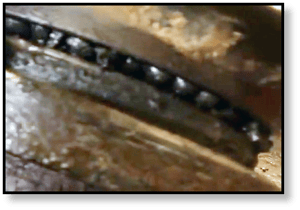If your compact track loader or skid steer has started making unusual noises, don’t ignore it. Strange sounds are one of the first signs that something may be going wrong inside your final drive motor. And if you catch the problem early, you might be able to avoid costly repairs—or worse, a complete failure that brings your jobsite to a halt.

In this Shop Talk Blog post, we walk through some common noises that could mean trouble, and then explain what might be causing them. Whether you're a seasoned contractor or running a growing fleet, knowing what to listen for can save time, money, and frustration.
Here are a few other Shop Talk Blog posts you might find helpful:
Grinding or Growling
 This one is hard to miss. If you hear a deep grinding or growling sound coming from your machine, it’s usually a sign of metal-on-metal contact. That can mean the bearings inside your final drive are worn out, or the gear teeth are damaged.
This one is hard to miss. If you hear a deep grinding or growling sound coming from your machine, it’s usually a sign of metal-on-metal contact. That can mean the bearings inside your final drive are worn out, or the gear teeth are damaged.
Grinding typically means that something that should be smooth is now rough. Perhaps contaminants have entered the system. Maybe the gear oil hasn’t been changed in a while. Either way, it’s a sign that damage is already happening, and it’s only going to get worse unless you stop and investigate.
High-Pitched Whining or Screeching
A constant whining or screeching noise may seem less dramatic than a grind, but it’s just as serious. This sound often means there’s a hydraulic issue, possibly cavitation or fluid starvation. It can also be caused by restrictions in the system or suction-side leaks. It can also point to an issue with the hydraulic motor brakes and the charge pump. If the brakes aren't releasing like they should, they will generate this type of sound.
If your hydraulic fluid is too low, contaminated, or aerated, your final drive may not be getting the pressure it needs. The result? Screeching seals, stressed components, and heat buildup. Left unchecked, this can lead to blown seals or even a seized motor.
Clicking or Knocking
 If you notice a rhythmic clicking or knocking (especially when turning) it could mean something is loose or broken inside the drive. Think about how it feels when your washing machine has a shoe in it. Something’s off-balance, and it’s only a matter of time before it breaks completely.
If you notice a rhythmic clicking or knocking (especially when turning) it could mean something is loose or broken inside the drive. Think about how it feels when your washing machine has a shoe in it. Something’s off-balance, and it’s only a matter of time before it breaks completely.
Clicking is often linked to damaged bearings or broken gear teeth. If the issue is mechanical, that sound is a clue that parts inside your final drive aren’t meshing properly. If caught early, you might be able to replace the faulty part. If ignored, it could lead to total failure.
Hissing or Fizzing
Hear a hissing or air-like fizzing noise coming from your hydraulic system? That’s not normal. In most cases, it means there’s air in the system, a type of contamination that’s easy to overlook.
Air can get in through loose fittings, cracked lines, or failing seals. Once inside, it can cause foaming in the hydraulic fluid, which reduces lubrication and leads to increased wear on internal parts. Over time, aerated fluid can damage seals, overheat components, and significantly reduce the lifespan of your final drive.
Loud Popping or Banging
 If you hear a sudden pop or bang, shut down the machine right away. This kind of sound usually means something inside has failed badly. You could be dealing with broken gears, a cracked housing, or a major hydraulic lock-up.
If you hear a sudden pop or bang, shut down the machine right away. This kind of sound usually means something inside has failed badly. You could be dealing with broken gears, a cracked housing, or a major hydraulic lock-up.
At this point, the final drive may already be beyond repair. Continuing to operate the equipment could also damage other systems. The safest course of action is to stop what you're doing and call for expert help.
What To Do If You Hear These Noises
Hearing something unusual? Take it seriously. Here’s what to do next:
- Stop your machine to prevent further damage.
- Check fluid levels—low or contaminated oil could be part of the problem.
- Look for leaks, broken seals, or signs of metal shavings.
- Contact an expert or reach out to Texas Final Drive for guidance.
It’s tempting to keep working and hope it gets better, but these noises are your warning signs. Acting early could be the difference between a simple seal replacement and a full teardown.
Trust Your Ears—And the Experts
When it comes to heavy equipment, your ears can be just as valuable as your tools. If something doesn’t sound right, there’s usually a reason. Paying attention now can prevent expensive downtime later.
At Texas Final Drive, we’ve helped contractors and fleet managers catch issues before they turn into full-blown failures. Our final drive experts are here to help with diagnostics, replacement parts, and advice, as well as our massive inventory of ready-to-ship new, aftermarket, and reman final drive motors.
Give us a call at (281) 259-5267 or explore more maintenance tips on our Shop Talk Blog. Don’t let a strange sound turn into a serious problem: listen early and act fast.
